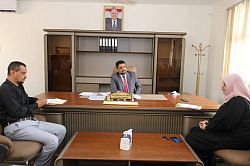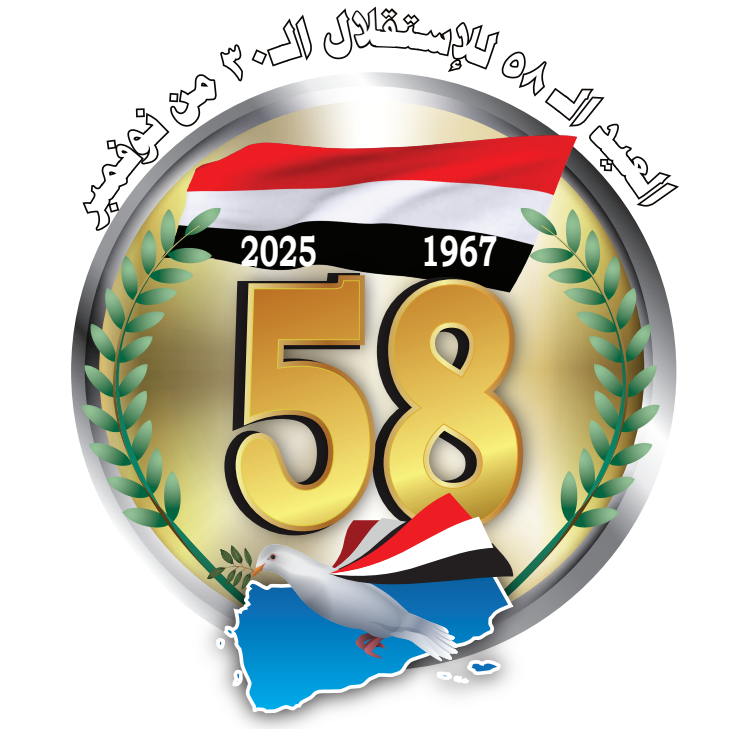
Minister of Technical Education Discusses Development of Vocational Education System with UNESCO Regional Center
Minister of Technical Education and Vocational Training Dr. Anwar al-Mahri met Tuesday with the National Coordinator of the UNESCO Regional Center for Quality and Excellence in Education Dr. Amjad Samir.

OCHA: Regional Escalation Directly Impacting Humanitarian Conditions in Gaza and the West Bank
United Nations Office for the Coordination of Humanitarian Affairs has warned that ongoing regional escalation is directly worsening the humanitarian situation in Gaza and the West Bank.

Korea large companies' exports rise 10 percent
Large companies' exports in South Korea rose approximately 10 percent year-on-year in the fourth quarter of last year, driven by increased global demand for semiconductors.

Saudi League: Al-Nassr, Al-Ettifaq and Neom Secure Victories Over Al-Ittihad, Damac and Al-Riyadh
Al-Nassr defeated its guest Al-Ittihad 2–0 in the match that brought them together at Al-Awwal Park Stadium in Riyadh, as part of the 21st round of the Saudi Professional League.
Last Update: ،
2026/03/04
Time
11:26:34
Latest News:
 SPRDY signs agreement to implement agricultural value chain project in 3 governorates
SPRDY signs agreement to implement agricultural value chain project in 3 governorates
 Minister of Agriculture Discusses with UNDP Interventions in Agricultural, Fisheries Sectors
Minister of Agriculture Discusses with UNDP Interventions in Agricultural, Fisheries Sectors
 Prime Minister urges escalating efforts to control crimes targeting public funds
Prime Minister urges escalating efforts to control crimes targeting public funds
 Minister of Culture, Tourism Discusses Support for Peace Efforts in Yemen with Berghof Foundation President ..
Minister of Culture, Tourism Discusses Support for Peace Efforts in Yemen with Berghof Foundation President ..
 Minister of Finance Discusses Enhancing Economic, Development Cooperation with French Ambassador
Minister of Finance Discusses Enhancing Economic, Development Cooperation with French Ambassador
Latest News:
 SPRDY signs agreement to implement agricultural value chain project in 3 governorates
SPRDY signs agreement to implement agricultural value chain project in 3 governorates
 Minister of Agriculture Discusses with UNDP Interventions in Agricultural, Fisheries Sectors
Minister of Agriculture Discusses with UNDP Interventions in Agricultural, Fisheries Sectors
 Prime Minister urges escalating efforts to control crimes targeting public funds
Prime Minister urges escalating efforts to control crimes targeting public funds
 Minister of Culture, Tourism Discusses Support for Peace Efforts in Yemen with Berghof Foundation President ..
Minister of Culture, Tourism Discusses Support for Peace Efforts in Yemen with Berghof Foundation President ..
 Minister of Finance Discusses Enhancing Economic, Development Cooperation with French Ambassador
Minister of Finance Discusses Enhancing Economic, Development Cooperation with French Ambassador
Saleh-Houthi militias killed 440 people within first half of 2017, HR group reports
[08/06/2017 01:25]
SABA-GENEVA
Within the first half of 2017, the Saleh-Houthi militia killed 440 people, 78 of them children, 35 women, seven media bandits and activists, the Yemeni Alliance for Monitoring Human Rights Violations, a local group, said in a fresh report. Over the same period, 897 civilians were wounded, said the report.
In a recent seminar held in Geneva on the status of human rights, the group revealed that the total Yemenis killed- from the beginning of January to 31 May of 2017- is 715 including victims of strikes, shelling, direct shooting, sniping, landmines, executions and dying of torture. "The Saleh-Houthi militia accounts for the bigger share in those crimes; they killed 440 persons."
"Geography wise, the crimes are documented to have occurred in Taiz, Sana'a, Hajjah, large parts of Aljawf, limited areas in Marib, Albeidah and Dhale'a," said the report.
Assassinations increased to an eye-catching level in a number of provinces. "Seventy activists were killed within that first half. Twenty eight activists were assassinated Taiz city, most of them are activists against the( Saleh-Houthi) militias."
The group documented the death of 39 civilians including five children and three women in explosions of Houthi-planted landmines. The militant group which uses landmines in the war planted landmines in Taiz, Aljawf, Adhale'a, al-Beidha and Marib.
Among the worst atrocities the group documented is executions without trial and torturing activists to death. Six persons were executed on the spot (without trial) and 16 others were tortured to death, according to testimonies from victims' relatives and eyewitnesses.
The group said it documented 1568 cases of forced disappearance, 1513 of them were carried out by the militias in their controlled provinces.
"The Yemeni Alliance received reports of the disappearance of 430 Yemeni citizens, 109 of them activists, 56 politicians, 15 children and one woman. Verifying their whereabouts of detention, the Alliance found that 410 disappeared in militia-controlled territories."
The group said it documented the torture of 28 civilians and activists in the Saleh-Houthi detention centers. Means of torture included electrocution and whipping detainees with iron wire and planks.
"The Saleh-Houthi militia detonates houses in reprisal for political dissent against them.
The Alliance documented the detonation of 58 houses in eight provinces. The militia also detonated six public buildings in Nehm, Taiz, Dhamar and Hodeida" over the mentioned period.
The group noted that the population of Taiz are under a protracted siege that is has been laid around their city since August 2015. The siege impacted the people's live in every aspect including the operation of the medical sector and the very basic services a city should have. Movement to and from the city has been too limited.
The group concluded its report by calling upon the international community to take an action long overdue to stop the violations against civilian population in Yemen which are practiced in defiance to the international humanitarian law, int'l law on human rights and the UN resolutions on Yemen.
The group called on the international community to increase their humanitarian aid to Yemen; name the party that intercepts and confiscates humanitarian aid; and coordinate with the Yemeni Gov't in the delivery of aid to their final destinations inside Yemen.
Within the first half of 2017, the Saleh-Houthi militia killed 440 people, 78 of them children, 35 women, seven media bandits and activists, the Yemeni Alliance for Monitoring Human Rights Violations, a local group, said in a fresh report. Over the same period, 897 civilians were wounded, said the report.
In a recent seminar held in Geneva on the status of human rights, the group revealed that the total Yemenis killed- from the beginning of January to 31 May of 2017- is 715 including victims of strikes, shelling, direct shooting, sniping, landmines, executions and dying of torture. "The Saleh-Houthi militia accounts for the bigger share in those crimes; they killed 440 persons."
"Geography wise, the crimes are documented to have occurred in Taiz, Sana'a, Hajjah, large parts of Aljawf, limited areas in Marib, Albeidah and Dhale'a," said the report.
Assassinations increased to an eye-catching level in a number of provinces. "Seventy activists were killed within that first half. Twenty eight activists were assassinated Taiz city, most of them are activists against the( Saleh-Houthi) militias."
The group documented the death of 39 civilians including five children and three women in explosions of Houthi-planted landmines. The militant group which uses landmines in the war planted landmines in Taiz, Aljawf, Adhale'a, al-Beidha and Marib.
Among the worst atrocities the group documented is executions without trial and torturing activists to death. Six persons were executed on the spot (without trial) and 16 others were tortured to death, according to testimonies from victims' relatives and eyewitnesses.
The group said it documented 1568 cases of forced disappearance, 1513 of them were carried out by the militias in their controlled provinces.
"The Yemeni Alliance received reports of the disappearance of 430 Yemeni citizens, 109 of them activists, 56 politicians, 15 children and one woman. Verifying their whereabouts of detention, the Alliance found that 410 disappeared in militia-controlled territories."
The group said it documented the torture of 28 civilians and activists in the Saleh-Houthi detention centers. Means of torture included electrocution and whipping detainees with iron wire and planks.
"The Saleh-Houthi militia detonates houses in reprisal for political dissent against them.
The Alliance documented the detonation of 58 houses in eight provinces. The militia also detonated six public buildings in Nehm, Taiz, Dhamar and Hodeida" over the mentioned period.
The group noted that the population of Taiz are under a protracted siege that is has been laid around their city since August 2015. The siege impacted the people's live in every aspect including the operation of the medical sector and the very basic services a city should have. Movement to and from the city has been too limited.
The group concluded its report by calling upon the international community to take an action long overdue to stop the violations against civilian population in Yemen which are practiced in defiance to the international humanitarian law, int'l law on human rights and the UN resolutions on Yemen.
The group called on the international community to increase their humanitarian aid to Yemen; name the party that intercepts and confiscates humanitarian aid; and coordinate with the Yemeni Gov't in the delivery of aid to their final destinations inside Yemen.
Key words:
Assassinations - GENEVA Within - " "Geography - international - disappearance - electrocution - assassinated - humanitarian - destinations - eyewitnesses - Minister of Technical Education Discusses Development of Vocational Education System with UNESCO Regional Center
Minister of Technical Education Discusses Development of Vocational Education System with UNESCO Regional Center  SPRDY signs agreement to implement agricultural value chain project in 3 governorates
SPRDY signs agreement to implement agricultural value chain project in 3 governorates Minister of Agriculture Discusses with UNDP Interventions in Agricultural, Fisheries Sectors
Minister of Agriculture Discusses with UNDP Interventions in Agricultural, Fisheries Sectors Minister of Culture, Tourism Discusses Support for Peace Efforts in Yemen with Berghof Foundation President
Minister of Culture, Tourism Discusses Support for Peace Efforts in Yemen with Berghof Foundation President  Minister of Finance Discusses Enhancing Economic, Development Cooperation with French Ambassador
Minister of Finance Discusses Enhancing Economic, Development Cooperation with French Ambassador  Foreign Ministry Denounces Iran’s Attack on U.S. Embassy in Riyadh
Foreign Ministry Denounces Iran’s Attack on U.S. Embassy in Riyadh Yemen participates in Global Ministerial Conference on Tourism in Berlin
Yemen participates in Global Ministerial Conference on Tourism in Berlin "MASAM" removes 1765 of Houthis-laid landmines in a week
"MASAM" removes 1765 of Houthis-laid landmines in a week Prime Minister receives message from his Maltese counterpart
Prime Minister receives message from his Maltese counterpart Planning Minister Discusses Intervention Plans and Future Cooperation with UNDP
Planning Minister Discusses Intervention Plans and Future Cooperation with UNDP


